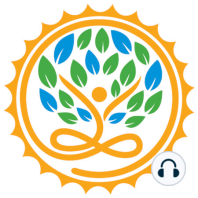35 min listen

The Neurophysiology of Safety and How to Feel Safe
The Neurophysiology of Safety and How to Feel Safe
ratings:
Length:
60 minutes
Released:
Sep 25, 2020
Format:
Podcast episode
Description
Stephen W. Porges, PhD. is Distinguished University Scientist at Indiana University where he is the founding director of the Traumatic Stress Research Consortium. In 1994 he proposed the Polyvagal Theory, a theory that links the evolution of the mammalian autonomic nervous system to social behaviour and emphasises the importance of physiological state in the expression of behavioural problems and psychiatric disorders. He has published more than 300 peer-reviewed papers across numerous behavioural and neurobiological disciplines. On this podcast, Dr Porges explains the Polyvagal Theory, including the biological effects of perceived safety or danger and the resulting impact on our social behaviour. He describes his music-based intervention, the Safe and Sound Protocol, that is used by more than 1,400 therapists to reduce hearing sensitivities and increase emotional control and behavioural organisation. He also discusses how the threat of COVID-19 can impact neurophysiology, and he shares practical strategies for creating feelings of safety. Here’s the outline of this interview with Stephen Porges: [00:00:14] Sue carter podcast: Oxytocin: More Than Just a “Love Hormone”. [00:02:25] Book: The Polyvagal Theory: Neurophysiological Foundations of Emotions, Attachment, Communication, and Self-regulation (Norton Series on Interpersonal Neurobiology), by Stephen Porges. [00:02:38] Book: The Pocket Guide to the Polyvagal Theory: The Transformative Power of Feeling Safe (Norton Series on Interpersonal Neurobiology), by Stephen Porges. [00:04:06] Polyvagal theory, described. [00:12:28] Social behaviour as a noninvasive vagal nerve stimulator. [00:14:36] Book: Nonviolent Communication: A Language of Life: Life-Changing Tools for Healthy Relationships, by Marshall B. Rosenberg. [00:14:44] Book: I Hear You: The Surprisingly Simple Skill Behind Extraordinary Relationships, by Michael S. Sorensen. [00:15:05] Biological rudeness. [00:15:57] Argument as a shift in physiological state. [00:16:38] We are terrible listeners. [00:21:43] Humor - the violation of expectancy within the containment of safety. [00:25:46] It's not what you say, it's how you say it. [00:27:13] Extracting human voices. [00:29:41] Sociality is a product of our body feeling safe. [00:30:57] Auditory hypersensitivity in autism. [00:34:22] The Safe and Sound Protocol (SSP). [00:38:57] Study validating SSP: Porges, Stephen W., et al. "Reducing auditory hypersensitivities in autistic spectrum disorder: preliminary findings evaluating the listening project protocol." Frontiers in Pediatrics 2 (2014): 80. [00:39:29] Polyvagal Study Group on Facebook. [00:41:15] COVID-19, the effect on neurophysiology; Article: Porges, S. W. "The COVID-19 Pandemic is a paradoxical challenge to our nervous system: a Polyvagal Perspective." Clin Neuropsychiatry 17 (2020): 135-8. [00:46:53] Creating feelings of safety. [00:50:50] Posture, dance; Yoga: Sullivan, Marlysa B., et al. "Yoga therapy and polyvagal theory: The convergence of traditional wisdom and contemporary neuroscience for self-regulation and resilience." Frontiers in human neuroscience 12 (2018): 67. [00:51:37] Article: Porges, Stephen W. "Vagal pathways: Portals to compassion." The Oxford handbook of compassion science (2017): 189-204. [00:54:41] Youtube videos featuring Stephen Porges. [00:55:24] Deb Dana, LCSW. [00:56:23] Stanford University’s The Center for Compassion and Altruism Research and Education (CCARE); Videos: 1. CCARE Science of Compassion 2014: The Psychophysiology of Compassion, 2. The Science of Compassion: Origins, Measures, and Interventions - Stephen Porges, PhD. [00:56:56] Video on spirituality: Dr Stephen Porges speaks about spirituality concepts from a Polyvagal perspective. [00:57:00] Article in Spectrum Newsletter: Brain-body connection may ease autistic people’s social problems, by Stephen Porges. [00:58:00] Dr Porges’s website.
Released:
Sep 25, 2020
Format:
Podcast episode
Titles in the series (100)
Nom Nom Paleo With Michelle Tam by Nourish Balance Thrive